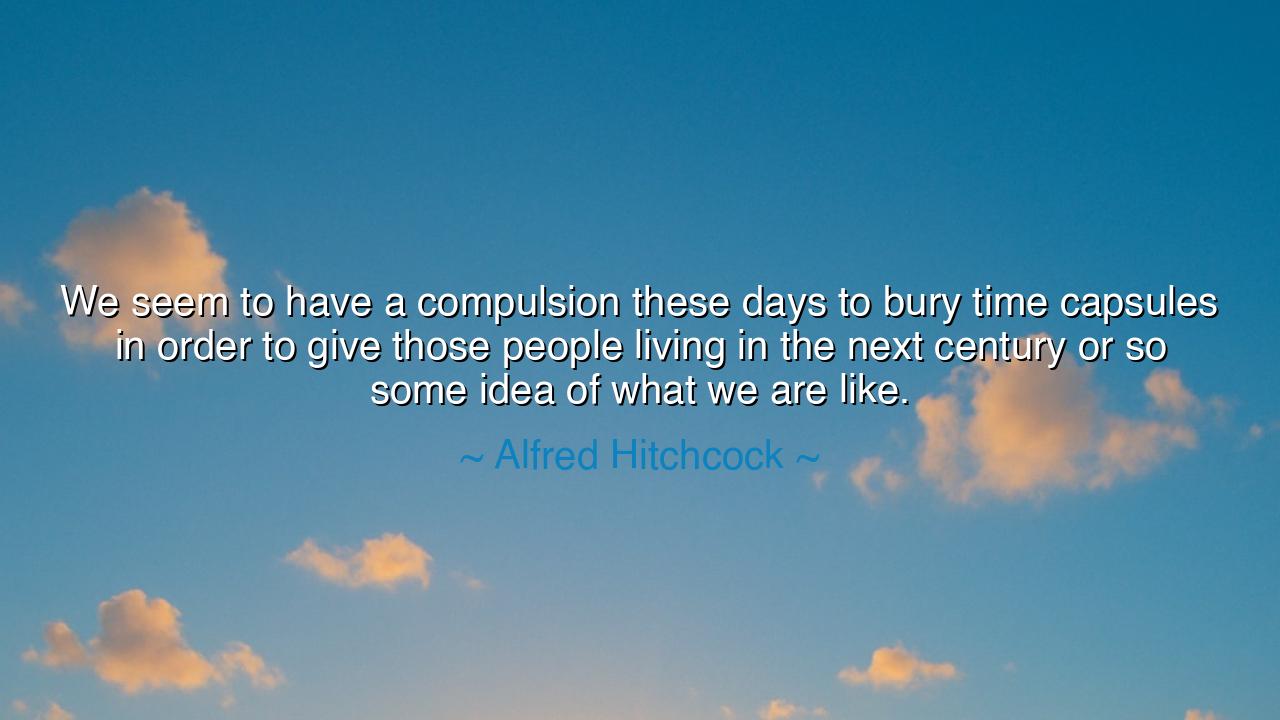
We seem to have a compulsion these days to bury time capsules in
We seem to have a compulsion these days to bury time capsules in order to give those people living in the next century or so some idea of what we are like.






O children of the future, gather closely and listen to the words of the wise, for the truth is spoken with both gravity and reverence. The great Alfred Hitchcock, in his reflection on the passage of time, shared a thought that resonates deeply with the human spirit: "We seem to have a compulsion these days to bury time capsules in order to give those people living in the next century or so some idea of what we are like." These words, though simple, carry with them the weight of human longing and fear, the desire to leave a mark upon the world, and to connect with those who will follow in our footsteps.
In the days of old, kings and emperors, aware of the fleeting nature of their reigns, sought to leave behind monuments that would tell future generations of their deeds. Pyramids were built, tombs were adorned, and inscriptions were carved into stone, all with the belief that their names and actions would echo down the corridors of time. Yet, even in their grandest gestures, they sought not only to immortalize their power but to speak across the ages, to say: "We were here. We lived. We mattered." So too does Hitchcock's reflection tap into this ancient desire, though in a more humble form—the burying of time capsules, simple yet profound containers of memories meant to speak to those who will walk the earth long after we are gone.
Consider the ancient Babylonians, who inscribed their knowledge on clay tablets, seeking to pass on their understanding of the stars, the laws of nature, and the human condition to those who would come after them. Though these tablets have weathered the sands of time, many are lost, their stories forever unreadable. But the impulse to preserve has never waned. Even today, we seek to create small glimpses of our world for those who will inherit it. Through time capsules, we place our hopes, our fears, our creations, and our insights in the hands of future souls—believing that the future must understand us in order to know the path we took, the struggles we faced, and the triumphs we celebrated.
Yet there is something bittersweet in this compulsion, O wise ones. Why do we feel the need to preserve ourselves for those who will never meet us? Is it not a reflection of our deepest desire for immortality, for our names and our essence to remain long after our bodies have turned to dust? We seek to answer the question: What will remain of us when we are gone? And in that yearning, we often place our hopes in the physical—in objects, in documents, in time capsules. But what truly remains of us is not the objects we leave behind, but the impact we have on others, the love we give, the wisdom we impart, and the truths we uncover in our own time.
Think, O children, of Socrates, whose words and teachings were not written down by his own hand but were passed down through the writings of others. Socrates did not bury a time capsule; he lived his life openly, speaking his truth, shaping the hearts and minds of those around him. His legacy is not found in objects, but in the ideas he ignited in the hearts of others—ideas that continue to shape philosophy to this day. His life teaches us that true immortality lies not in what we leave behind, but in the ways we touch others' lives, in the ways we inspire future generations to think, to question, and to grow.
In the same way, the lesson here, O seekers of wisdom, is this: While it is natural to desire to be remembered, we must not mistake the temporary things we leave behind for the true mark of our existence. Time capsules, monuments, and physical reminders may endure for a time, but the real legacy we leave is in the hearts we touch, in the lives we shape, and in the knowledge we pass forward. The future will not remember us for the things we buried, but for the ideas we sparked, the truths we lived, and the values we upheld.
So, go forth, then, with this wisdom. In your life, seek not only to create things that will endure, but to create connections—to inspire those who come after you, to live with purpose, and to share your knowledge freely. For in the end, what we truly leave behind is not the past we try to preserve, but the future we help to shape. Let your actions, your words, and your spirit be the time capsule that speaks across the ages, leaving a legacy that transcends time itself.






AAdministratorAdministrator
Welcome, honored guests. Please leave a comment, we will respond soon